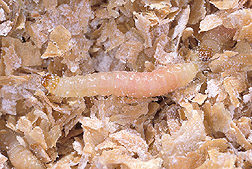This page has been archived and is being provided for reference purposes only. The page is no longer being updated, and therefore, links on the page may be invalid.
|
Special "Sting" Operation Could Guard Grocery Goods from Buggy Pests
By Erin PeabodyJune 17, 2005
It's possible that sometime in the future, as you stroll the aisles of your local grocery, armies of miniature wasps will be on patrol in your midst, keeping watch over packages of cornflakes and cartons of oats.
Harmless and practically invisible, parasitic wasps are an effective and Earth-friendly way to keep serious food pests in check, according to Paul Flinn, a biologist with the Agricultural Research Service at Manhattan, Kan.
One of the most problematic and costly insects in retail and warehouse environments is the Indianmeal moth. Its larvae can infest stored products--like bags of grain, cereal or pet food--and even chew through protective packaging. Adult female moths are very efficient at reproduction, laying as many as 300 eggs in just one week.
Traditionally, the moths have been controlled with chemical fumigants or fogs. But Flinn wondered if the moth's natural enemies--wasps in the genus Trichogramma--could be as effective. To explore this possibility, he teamed up with Matt Grieshop, who recently completed his Ph.D. on this work at Kansas State University in Manhattan.
They found that T. deion, a wasp no bigger than a speck of dust, was able to zero in on, sting and kill the moth eggs. The wasps worked best when the researchers released them in fairly simple environments, where moth eggs had been placed on shelves or on top of product packaging.
When Trichogramma wasps were paired with another tiny parasitic wasp from the genus Habrobracon, the results were even better. According to Flinn, Trichogramma goes after the moth eggs before they can develop into damaging larvae. Habrobracon finishes the job by killing any larvae that develop from eggs that Trichogramma may have missed.
Growers have been using Trichogramma wasps for decades to control outdoor pests plaguing cotton and other crops, so the beneficial insects would be readily available to the pest control industry.
Flinn works in the ARS Grain Marketing and Production Research Center in Manhattan.
ARS is U.S. Department of Agriculture's chief scientific research agency.


